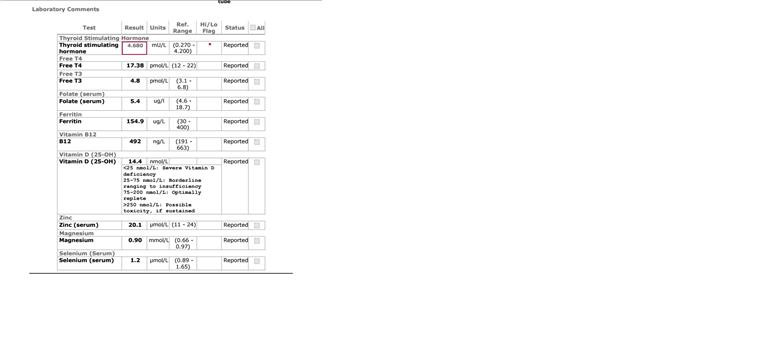I finally got my blood test results back for a package I specifically chose and have added them as a photo to this post.
The doctors comments (not my GP as I went private this time) are as follows:
----------------------------------------------------------------------------------------------------------------------------------------------------
The Thyroid Stimulating Hormone (TSH) is elevated. If you are already taking a form of thyroxine, it is possible that that your dose is too low or that you have forgotten to take it on occasion. It may be that an increase in dose is in order - if adjusted it would be sensible to repeat thyroid function (TFT) testing in around 2 months time. If you are not taking thyroxine, and this is the first time TSH has been noted to be high, it is possible that 'non-thyroidal illness' or other medication effects are the cause of the elevation. It may be that hypothyroidism (underactive thyroid gland) is about to develop. In these scenarios, it would be advisable to repeat thyroid function tests in 3 months time. If this a repeat elevated TSH, it would be a good idea to consider checking thyroid antibodies if not previously tested. If antibody testing is positive, an annual check of TFT would be in order as your risk of developing thyroid disease would be higher than average. I would suggest undertaking this repeat test sooner if symptoms develop. The usual advice is to consider commencing thyroxine if TSH rises above 10 mU/L. Some authorities advise commencing thyroxine at lower TSH levels.
There is marked Vitamin D deficiency. Vitamin D is manufactured in our skin as a direct result of sunlight exposure. One potential complication of prolonged Vitamin D lack is osteomalacia, a disease which causes severe structural deformities to the skeleton. Lower level Vitamin D deficiency can lead to a number of non specific symptoms, including possibly chronic fatigue (experts have for many years noted an association between sufferers of chronic fatigue syndrome or myalgic encephalitis (CFS or ME) and low blood levels of Vitamin D). It has been estimated that between 50-70% of people living in the northern Europe (where daylight length reduces your chances of receiving adequate sunlight in the winter) are deficient in this vitamin by March each year. Symptoms of vitamin D deficiency include chronic pain, weak bones, frequent infections (recent research has detected an association between vitamin D deficiency and severe pneumonia), depression and fatigue. I suggest you speak to your doctor about this result as supplementation looks to be advisable.
---------------------------------------------------------------------------------------------------------------------------------------------------
What do you think? It is nice after 4 years to finally have something show up but seems they are saying I should wait to be tested again. I honestly feel like absolute death right now. Should I give these to my GP or will he just basically say the same? My antibodies came back as negative.
